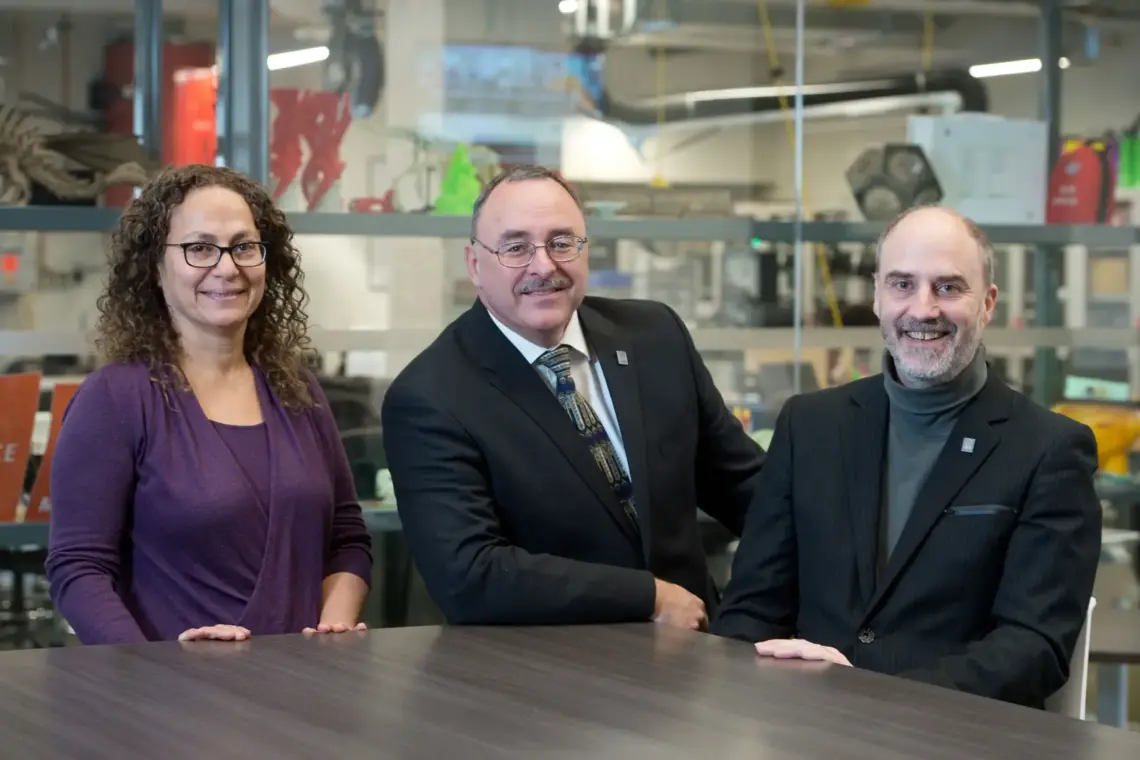
The University of Ottawa is poised to be the first post-secondary institution with a physical presence in Canada’s largest technology park, filling a gap that Kanata North industry leaders say will increase access to cutting-edge research and highly skilled graduates.
In early 2018, Sylvain Charbonneau – the school’s vice-president of research – commissioned a consultation of companies in the tech park. He says three needs came back loud and clear: a need for talent, a need for retraining and lifelong learning, and a need for access to research.
“The technologies are changing so rapidly now that reskilling is extremely important,” says Charbonneau. “We wanted to be right in the middle of it.”
Charbonneau says the world’s leading tech parks all have something in common: a post-secondary presence, such as Stanford University in Silicon Valley.
“You live, work and play in Kanata. And now you’re going to start learning,” says Charbonneau, echoing the theme he introduced at the official announcement during November’s Tech Tuesday: “Live, work, play, learn.”
“Learn” is a piece that’s been missing from Kanata North, Charbonneau says, and business leaders in the park agree.
A governance committee comprised of directors and deans from the university as well as representatives from the Kanata North Technology Park, including Veronica Farmer and Jamie Petten of the Kanata North Business Association, has been meeting for months to plan the initiative.
The committee meetings served a basic but important purpose: “Getting to know each other,” says Amy MacLeod, a Mitel vice-president and KNBA board chair.

— KNBA board chair Amy MacLeod.
“It seems silly,” she says. “They’re only 25 minutes down the highway. But there’s a basic introduction that needs to happen.”
Until she joined the committee, MacLeod says she wasn’t aware of just how many U of O alumni work in Kanata – some 5,000, according to the university.
“The partnership has proven valuable even before the presence has been established,” she says. “It’s always been part of the community.”
MacLeod says establishing a university presence in the tech park will help more people realize just how much of the talent there today is homegrown.
“This is a great time to really start to think about who we are and where innovation comes from,” she says. “A big part of it is already coming from uOttawa alumni.”
Physical presence
The initial physical space in Tower C at 555 Legget Dr. will have an office and classroom, with an open, coworking-style feel, says Charbonneau, adding that he envisions a full Kanata North campus in the future.
Though the space isn’t open yet, the university has already made its mark on Kanata North – in early December, the school held a co-op fair at You.i TV.
Heather Tyrie, You.i TV’s vice-president of employee experience, says holding the fair in Kanata North gives students a chance to see that the tech park is more than just a collection of office buildings.
“It’s a great opportunity for them to see what Kanata’s all about, and to see that it’s probably a little different than what they thought,” she says.
There were 178 University of Ottawa co-op students working in Kanata during the fall 2018 semester, according to the school.
Tyrie says the university’s physical space in Kanata will also serve as a place for co-op students to meet up, helping them establish a network in the tech park during their time there.
“The social connections are really important for co-op students,” she says.
But it’s not just the university’s co-op students that stand to benefit from the initiative. MacLeod says partnerships between researchers and industry experts could bridge the gap between long-term research and the short-term constraints of commercial technology.
“Universities are brilliant at long-term, pure research,” she says. “(But businesses) have to deliver a product quickly and get it to market quickly.”
Jacques Beauvais, the dean of the university’s Faculty of Engineering, echoes those sentiments, adding that the university’s ability to perform dedicated long-term research could allow them to work on problems identified by industry experts, especially in the constantly evolving fields of autonomous vehicles, artificial intelligence, Internet of Things and cybersecurity.
“High-tech companies need to innovate,” says Beauvais. “The only way we’re going to accelerate the process to support them is to get our students working directly with them.”
MacLeod hopes the partnership will help solve one of the Kanata tech industry’s biggest challenges.
“We need talent,” says MacLeod. “We want more than our fair share of University of Ottawa graduates out here employed in the park, making a career in the park.”
MacLeod says she sees the initiative as a catalyst for the tech park’s future growth.
“We’ve done really, really well. Imagine what we can do now that we’ve got that missing piece.”
